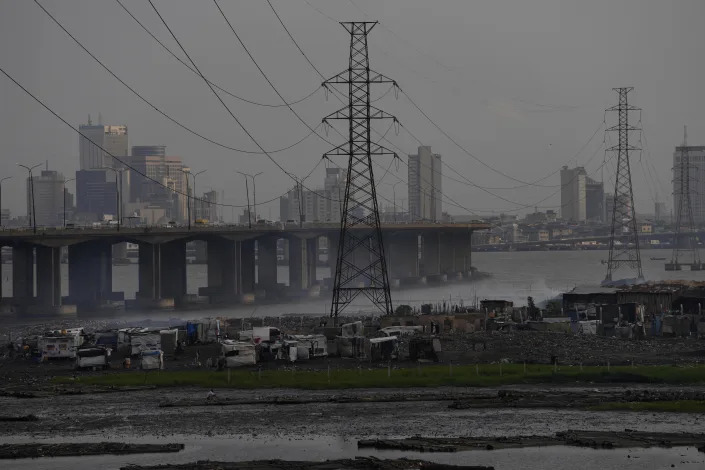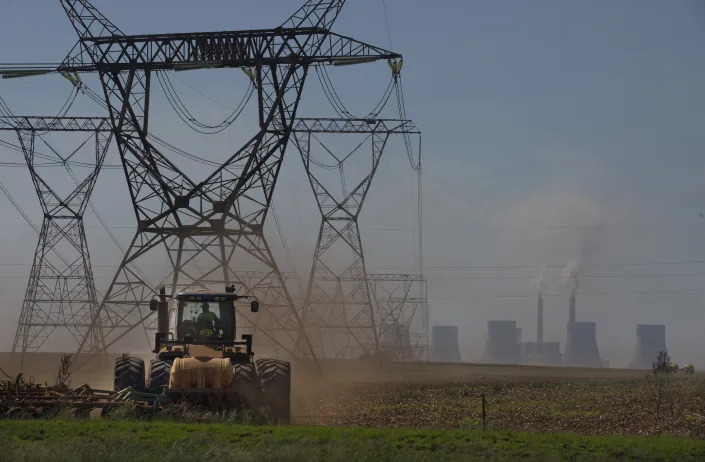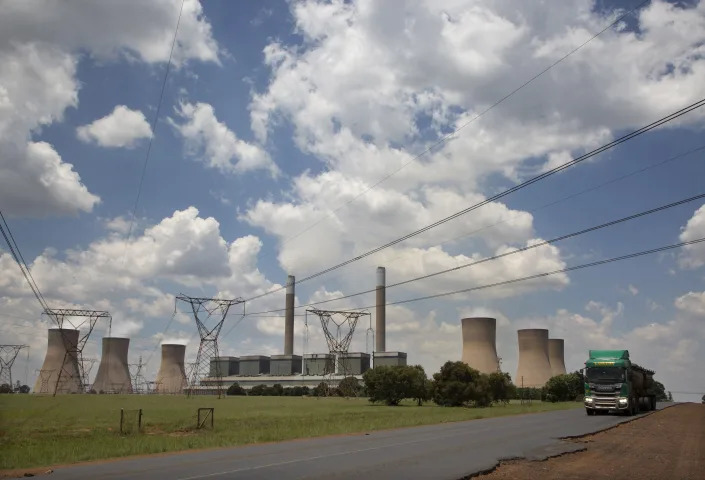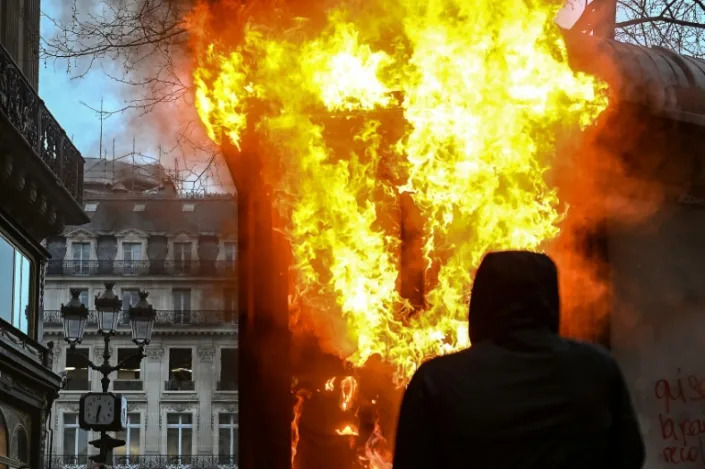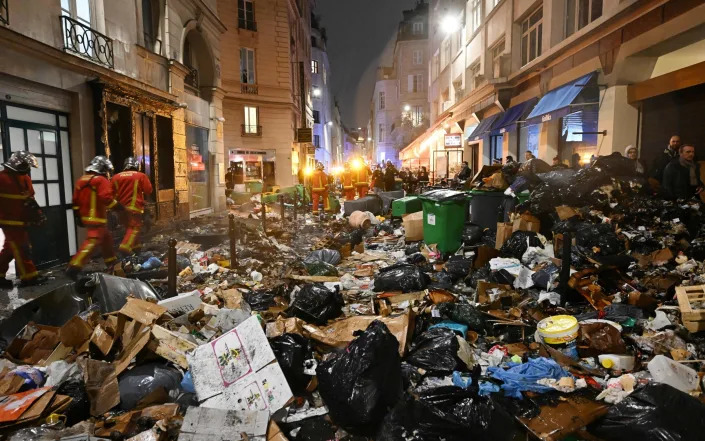Israeli defense minister calls for halt to judicial overhaul

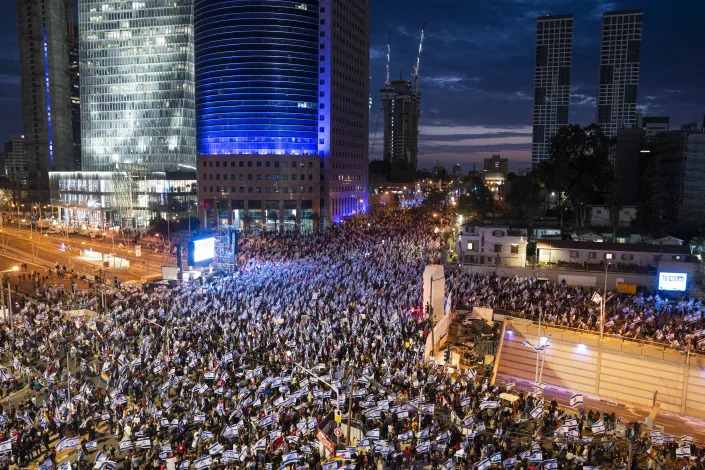

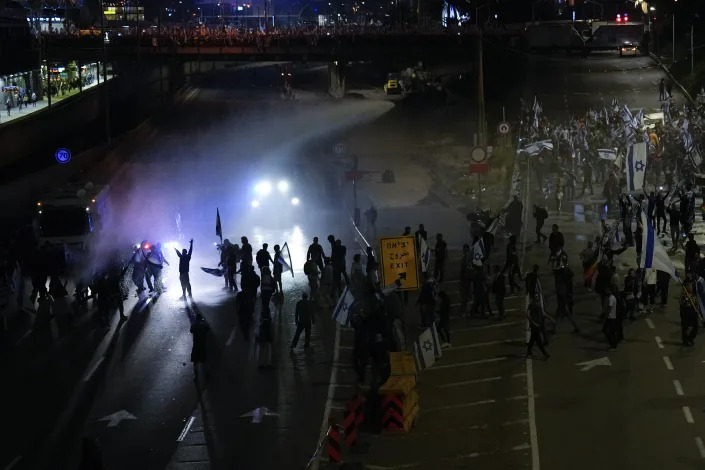

Demonstrators block a highway during a protest against plans by Prime Minister Benjamin Netanyahu's government to overhaul the judicial system in Tel Aviv, Israel, Saturday, March 25, 2023.
(AP Photo/Ariel Schalit)
ISABEL DEBRE
Sat, March 25, 2023
JERUSALEM (AP) — Israel's defense minister became the first ally in Prime Minister Benjamin Netanyahu's coalition to break ranks on Saturday as he called for an immediate halt to the far-right government's contentious plan to overhaul the country's judiciary.
In a televised address, Israeli Defense Minister Yoav Gallant expressed concern over the turmoil within Israel's military that he said posed a threat to the country's security. Citing the need for dialogue with the opposition, Gallant asked that Netanyahu’s coalition wait until after Parliament reconvenes from its holiday break next month before pushing ahead with its divisive plan to weaken the Supreme Court.
“For the sake of Israel’s security, for the sake of our sons and daughters, the legislative process must be stopped at this time,” Gallant, a top official in Netanyahu's Likud party, said.
The government's plan to increase its control over the judiciary has sparked the largest protest movement in Israeli history and triggered a grave national crisis, including even warnings from the president of civil war.
On Saturday, tens of thousands of protesters took to the streets as they have every week since the start of the year — in many cases bringing parts of Jerusalem and Tel Aviv to a standstill. It has also raised the hackles of Israel's closest allies, testing its ties with the United States.
Police unleashed water cannons on masses of protesters who whistled and waved Israeli flags as they marched down Ayalon highway in Tel Aviv on Saturday night. “Shame! Shame!” they chanted in Hebrew. As the protesters advanced, officers on horseback violently rammed into the crowds. “Haven't the Jewish people suffered enough?” read one protester's sign.
The judicial proposal has drawn intensifying criticism from across Israeli society — including from former prime ministers and defense officials, high-tech business leaders, Israel’s attorney general and American Jews.
In recent weeks, discontent over the overhaul has even surged from within Israel's army — the country’s most popular and respected institution, which has historically been an apolitical unifier. A growing number of Israeli reservists have threatened to withdraw from voluntary duty in the past weeks, posing a broad challenge to Netanyahu as he defiantly plows ahead with the judicial changes while on trial for corruption.
“The events taking place in Israeli society do not spare the Israel Defense Forces — from all sides, feelings of anger, pain and disappointment arise, with an intensity I have never encountered before,” Gallant said. “I see how the source of our strength is being eroded.”
In security-minded Israel, the unrest has prompted concern about the Israeli military's stability as it maintains its 55-year-old occupation of the West Bank and faces threats from Lebanon's Hezbollah militant group and from its archenemy Iran.
Violence both in Israel and the occupied West Bank has escalated over the past few weeks to heights unseen in years. On Saturday, a Palestinian shot and wounded two Israeli soldiers in the northern West Bank town of Hawara, the site of a violent settler rampage last month.
“This is a clear, immediate and tangible danger to the security of the state,” he said, referring to the judicial plans. “I will not take part in this.”
Gallant stopped short of saying what, if anything, he would do if Netanyahu ignored his plea. But his strong statement of concern for the polarized nation marked the first crack in Netanyahu’s coalition, the most right-wing and religiously conservative government in Israeli history.
Despite mounting dissent, the government passed a key part of the overhaul on Thursday, approving legislation that would protect the Israeli leader from being deemed unfit to rule because of his trial and claims of a conflict of interest. Critics say the law is tailor-made for Netanyahu and encourages corruption.
That day, Gallant met with Netanyahu, reportedly to voice concerns that protests by Israeli reservists and other security forces were hurting Israel’s international image and power of deterrence. After the meeting, Netanyahu nonetheless announced that he would become directly involved in the overhaul, declaring his hands “untied."
Israel's attorney general issued a sharp rebuke on Friday, warning that Netanyahu had broken the law by announcing his direct involvement in the overhaul while facing criminal charges — a stern statement that raised the specter of a constitutional crisis.
Netanyahu is on trial for fraud, breach of trust and accepting bribes in a series of scandals involving wealthy associates and powerful media moguls. He denies wrongdoing and dismisses critics who say he could find an escape route from the charges through the legal overhaul his government is advancing.
Supporters of the judicial overhaul — which includes plans to increase the coalition's control over judicial appointments and diminish the Supreme Court's ability to strike down laws passed by Parliament — say it will restore power to elected legislators and make the courts less interventionist. Critics say the move upends Israel’s system of checks and balances and pushes it toward autocracy.
In spite of the backlash, Netanyahu has dismissed offers for a compromise, including from Israel's mainly ceremonial president earlier this month.
“For the sake of our security, for the sake of our unity, it is our duty to return to the arena of dialogue,” Gallant said.
___
Associated Press writer Sam McNeil in Tel Aviv, Israel contributed to this report.
ISABEL DEBRE
Sat, March 25, 2023
JERUSALEM (AP) — Israel's defense minister became the first ally in Prime Minister Benjamin Netanyahu's coalition to break ranks on Saturday as he called for an immediate halt to the far-right government's contentious plan to overhaul the country's judiciary.
In a televised address, Israeli Defense Minister Yoav Gallant expressed concern over the turmoil within Israel's military that he said posed a threat to the country's security. Citing the need for dialogue with the opposition, Gallant asked that Netanyahu’s coalition wait until after Parliament reconvenes from its holiday break next month before pushing ahead with its divisive plan to weaken the Supreme Court.
“For the sake of Israel’s security, for the sake of our sons and daughters, the legislative process must be stopped at this time,” Gallant, a top official in Netanyahu's Likud party, said.
The government's plan to increase its control over the judiciary has sparked the largest protest movement in Israeli history and triggered a grave national crisis, including even warnings from the president of civil war.
On Saturday, tens of thousands of protesters took to the streets as they have every week since the start of the year — in many cases bringing parts of Jerusalem and Tel Aviv to a standstill. It has also raised the hackles of Israel's closest allies, testing its ties with the United States.
Police unleashed water cannons on masses of protesters who whistled and waved Israeli flags as they marched down Ayalon highway in Tel Aviv on Saturday night. “Shame! Shame!” they chanted in Hebrew. As the protesters advanced, officers on horseback violently rammed into the crowds. “Haven't the Jewish people suffered enough?” read one protester's sign.
The judicial proposal has drawn intensifying criticism from across Israeli society — including from former prime ministers and defense officials, high-tech business leaders, Israel’s attorney general and American Jews.
In recent weeks, discontent over the overhaul has even surged from within Israel's army — the country’s most popular and respected institution, which has historically been an apolitical unifier. A growing number of Israeli reservists have threatened to withdraw from voluntary duty in the past weeks, posing a broad challenge to Netanyahu as he defiantly plows ahead with the judicial changes while on trial for corruption.
“The events taking place in Israeli society do not spare the Israel Defense Forces — from all sides, feelings of anger, pain and disappointment arise, with an intensity I have never encountered before,” Gallant said. “I see how the source of our strength is being eroded.”
In security-minded Israel, the unrest has prompted concern about the Israeli military's stability as it maintains its 55-year-old occupation of the West Bank and faces threats from Lebanon's Hezbollah militant group and from its archenemy Iran.
Violence both in Israel and the occupied West Bank has escalated over the past few weeks to heights unseen in years. On Saturday, a Palestinian shot and wounded two Israeli soldiers in the northern West Bank town of Hawara, the site of a violent settler rampage last month.
“This is a clear, immediate and tangible danger to the security of the state,” he said, referring to the judicial plans. “I will not take part in this.”
Gallant stopped short of saying what, if anything, he would do if Netanyahu ignored his plea. But his strong statement of concern for the polarized nation marked the first crack in Netanyahu’s coalition, the most right-wing and religiously conservative government in Israeli history.
Despite mounting dissent, the government passed a key part of the overhaul on Thursday, approving legislation that would protect the Israeli leader from being deemed unfit to rule because of his trial and claims of a conflict of interest. Critics say the law is tailor-made for Netanyahu and encourages corruption.
That day, Gallant met with Netanyahu, reportedly to voice concerns that protests by Israeli reservists and other security forces were hurting Israel’s international image and power of deterrence. After the meeting, Netanyahu nonetheless announced that he would become directly involved in the overhaul, declaring his hands “untied."
Israel's attorney general issued a sharp rebuke on Friday, warning that Netanyahu had broken the law by announcing his direct involvement in the overhaul while facing criminal charges — a stern statement that raised the specter of a constitutional crisis.
Netanyahu is on trial for fraud, breach of trust and accepting bribes in a series of scandals involving wealthy associates and powerful media moguls. He denies wrongdoing and dismisses critics who say he could find an escape route from the charges through the legal overhaul his government is advancing.
Supporters of the judicial overhaul — which includes plans to increase the coalition's control over judicial appointments and diminish the Supreme Court's ability to strike down laws passed by Parliament — say it will restore power to elected legislators and make the courts less interventionist. Critics say the move upends Israel’s system of checks and balances and pushes it toward autocracy.
In spite of the backlash, Netanyahu has dismissed offers for a compromise, including from Israel's mainly ceremonial president earlier this month.
“For the sake of our security, for the sake of our unity, it is our duty to return to the arena of dialogue,” Gallant said.
___
Associated Press writer Sam McNeil in Tel Aviv, Israel contributed to this report.
